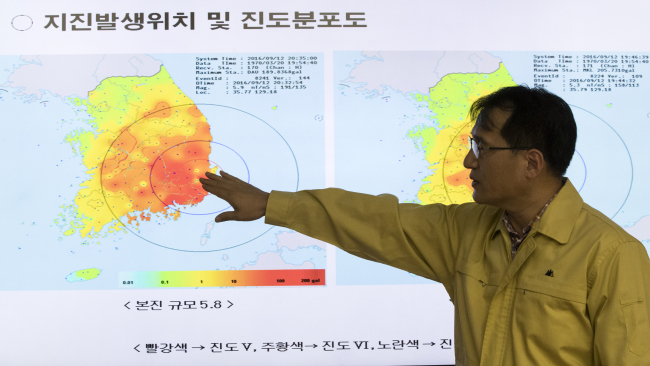 |
A Korea Meteorological Administration official explains the epicenter of the record magnitude-5.1 earthquake at the agency’s office, Monday. (Yonhap) |
The quake was preceded by a 5.1-magnitude tremor detected at 7:44 p.m. which was centered about 9 kilometers south of Gyeongju.
The second quake was felt in most parts of the country that generally does not have a lot of tremors. Gyeongju is the old capital of the Shilla Kingdom (57 B.C.-935 A.D) and is located 371 kilometers southeast of Seoul.
The KMA said the series of earthquakes were strong enough to be felt throughout the nation. An official from the Seoul Metropolitan Government said the second tremor felt like a magnitude-2 earthquake in the capital city.
As of 1:00 a.m. Tuesday, the agency said South Korea suffered from 111 aftershocks estimated at a magnitude of between 2 and 4, adding the number may increase.
According to the Ministry of Public Safety and Security, a total of six civilians were injured and 102 damage cases reported across the country as of midnight.
Types of damage mostly included broken glass and cracks to walls and floors, the ministry said. It, however, said there was a spike in people calling authorities to find out about the quake.
Korea Hydro & Nuclear Power Co., which operates the country's nuclear plants, said it manually shut down four Wolsong plants, which are close to the epicenter, to carry out thorough safety checks as part its moves to follow the emergency manual.
It, however, stressed that none of the reactors are affected, adding that they were able to safely generate the electricity.
On the other hand, a combined cycle power plant in Ulsan, not far from Gyeongju, reported one of its thermal power generation units going off line.
As a preventive measure Samsung Electronics voluntarily suspended their production lines in a state-run industrial estate in Gumi, North Gyeogsang Province.
The concerned factory is one of indirect processing plants that produce small plastic cases for Galaxy S smartphone and tab series.
“Because the production lines are only for imprinting the frames for the small plastics, it does not directly affect the production of smartphones and tabs,” Samsung officials said.
LG Display’s production lines in the same district also temporarily stopped the automatic moving line for LCD panels as the earthquake outbreak can break the large and thin panels, the company said.
Most people in the region near the quakes' centers felt homes and buildings shake violently, with residents living in an 80-story highrise in South Korea's largest port city of Busan saying they felt the building shudder. Busan International Finance Center said it evacuated most people from its 63-story building as a precautionary measure.
“From my desk to the room wall, everything was suddenly shaking. I urgently ran out of my dorm. I’m still too scared to go back to my room,” a 30-year-old female graduate school student surnamed Kim in Busan, told The Korea Herald.
The government said it set up the Central Disaster and Safety Countermeasures Headquarters to better collect damage reports and get a better grasp of the situation.
Authorities also said a few KTX bullet trains halted operations for short period of time causing delays at some stations. South Korea's most-used mobile messenger KakaoTalk, meanwhile, went offline shortly after the quake in Gyeongju.
Korea Airports Corporation said the earthquakes did not damage the facilities as well as flight schedules.
Shortly after the earthquakes, President Park Geun-hye said the government will do all it can to gauge details of damage caused by the seismic shocks, and vowed to come up with safety measures for key facilities including nuclear reactors.
Prime Minister Hwang Kyo-ahn ordered ministries to make full-fledged efforts to provide support to those suffering from physical or material damage. The prime minister's office said it has also ordered all related ministries to maintain emergency operations to prepare for additional aftershocks.
The government and the ruling Saenuri Party also plan to hold an emergency meeting on Tuesday to discuss what actions Seoul can take to safeguard the country from quakes down the road.
By Lee Hyun-jeong and news report (rene@heraldcorp.com)







